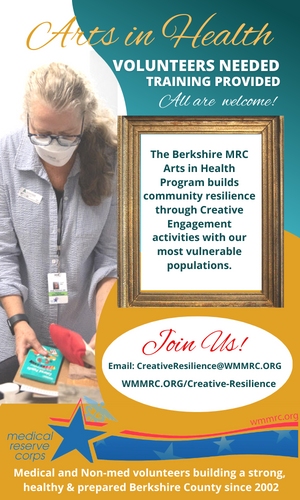Oral History shows promise as an effective approach for supporting well-being, with health benefits that include mental stimulation and improved memory. It provides social connections and improved self-esteem stemming from being recognized as having something of importance to contribute.
Narrator: Jeanne Dodge
Interviewer: Denise Schwartz
Date of Interview: March 16, 2022
Place of Interview: Conducted over Zoom
In 2021 Franklin MRC launched a program funded by a NACCHO COVID grant to bolster Senior Citizen Resilience by offering a variety of opportunities for creative engagement. The prominent form of engagement that emerged was Storytelling (Oral History). Volunteers interview older adults and guide them in recording their experiences of COVID.
Opportunities for valuable collaborations surfaced. Most were facilitated by MRC volunteers. MRC contacted the Foundation for Art and Healing to provide training on the Positive Impact of Creativity on Health. Then a volunteer facilitated a connection with the Housatonic Heritage Center for Oral History, which conducted workshops on Oral History and Interviewing. More than 60 volunteers/community members attended these trainings.
A volunteer, who also serves on the Advisory Board of OASIS (Older Adults Seeking, Inspiring and Serving) at Greenfield Community College (GCC), thought OASIS members would be a natural choice to be interviewed. Franklin MRC had volunteers in training to hone interviewing skills, and OASIS members had stories to tell – so another partnership was established. As an unexpected bonus, GCC’s Dean for Community Engagement, who oversees the OASIS Program, invited FMRC to use the college’s podcast recording studio for the interviews. This plan was halted, however, when in an abundance of caution the college closed the studio due to rising COVID numbers. FMRC pivoted to online interviews using the audio function of the Zoom platform. Twenty interviews have been recorded to date.
The Distance Learning Librarian and Archivist at the GCC Nahman-Watson Library came into the picture with an extensive passion for- and experience with – Oral Histories. She agreed to work with MRC and the library became the official archive for the stories. With her support, we upgraded the program to include Release Forms for the interviewees and transcription for the recordings, and the archival initiative is in process. To date, 27 interviews have been conducted and note that they will be archived on Digital Commonwealth. This project has been a true team effort. Perhaps the greatest collaboration is with those who shared their personal stories with us. We learned that helping others is a big motivator for individuals being interviewed. One interviewee said this: “I’m a little nervous, but feeling good about contributing my voice to whoever in the future wants to learn about our experiences.”
So much credit is attributed to one MRC volunteer, our star interviewer, who has taken on a leadership role in moving the program forward – which includes coordinating interviews and training other interviewers. She noticed that older adults are stronger and more resilient than one might assume. As a result, FMRC is considering applications for the data we hadn’t previously considered, such as potentially strengthening the region’s public health and response infrastructure. Students, historians, and public health professionals can hear about ways some older adults living in a rural area coped and resolved issues during a once in a lifetime pandemic.



